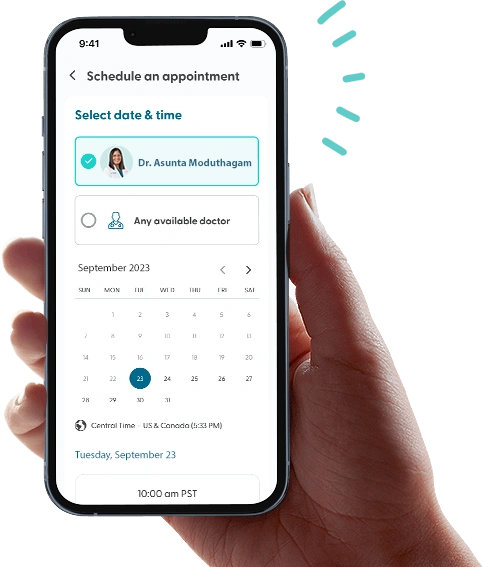Does Weed Help You Lose Weight?
The effects of marijuana often lead to polarizing discussions – especially surrounding food. The munchies are typically at the forefront of what weed does to your appetite, but health experts are starting to explore if cannabis can have the opposite effect.
In this article, we’ll discuss the relationship between weed and weight loss – and if the two can actually go hand in hand.
Get prescription weight loss medication online.
Find out if you're eligible for GLP-1s, and get started on your weight loss journey for as low as $75/month.


The Relationship Between Weed and Appetite
Typically when you think of the effects weed has on your appetite, the “munchies” are the first thing to come to mind.
The munchies are the intense cravings for food that often occur after consuming marijuana. This phenomenon is thought to be caused by the effects of THC – the psychoactive compound in marijuana – on the brain's appetite-regulating systems. It can lead to heightened senses of taste and smell, which in turn can result in increased feelings of hunger.
Essentially, THC tricks your brain into thinking that you're starving, causing an intense desire for food. This can lead to cravings for sugary, salty, or fatty treats that you might not normally reach for.
This occurs because THC has been shown to directly impact hunger hormones by increasing levels of ghrelin – a hormone that stimulates appetite. At the same time, it decreases levels of leptin – a hormone that signals feelings of fullness.
How Does Weed Affect Your Metabolism?
Weed can have a complex relationship with metabolism. Some studies suggest that THC may increase metabolism and energy expenditure, thus potentially aiding in weight loss.
When there is an increase in metabolism and energy expenditure, the body is able to burn calories more efficiently. This means that the body is using up stored energy (in the form of fat) to fuel various functions and activities. As a result, the body may start to burn more calories than it consumes, creating a calorie deficit. When the body is in a calorie deficit, it turns to stored fat for fuel, leading to weight loss over time. Essentially, an increased metabolism and energy expenditure can help facilitate the process of burning fat and losing weight.
Other studies indicate that weed can disrupt the body's ability to regulate blood sugar levels and lead to weight gain. When blood sugar levels are not properly regulated, it can lead to weight gain for several reasons.
One key factor is the effect of fluctuating blood sugar levels on hunger and cravings – another cause of the munchies.
When blood sugar levels are high, the body releases insulin to help lower them. However, excessive insulin release can lead to a rapid drop in blood sugar levels, triggering hunger and cravings for sugary or high-calorie foods as the body seeks to restore balance.
Additionally, unstable blood sugar levels can disrupt the body's ability to effectively utilize and store energy from food, potentially leading to weight gain.
Consistently high blood sugar levels can also contribute to insulin resistance – a condition that makes it harder for the body to regulate blood sugar and can lead to weight gain and other health issues over time.
Overall, the impact of weed on metabolism can vary from person to person and may depend on factors such as frequency of use, dosage, and individual metabolism.
If you like to indulge in marijuana, it's important to be mindful of your body's response to marijuana and its effects on your metabolism. This can help you determine if you’re overeating or choosing to snack on the wrong foods.
Weed and Exercise
Some individuals may find that consuming marijuana before exercise helps to enhance their focus, reduce pain or anxiety, and increase enjoyment of physical activity. For those who use weed as a means to reduce pain, mobility may increase after smoking or eating a little bit.
However, others may experience negative effects such as decreased coordination, impaired judgment, and reduced motivation. Sometimes, weed makes you want to relax on the couch, instead of getting up and moving your body.
Additionally, THC can impair cardiovascular function, potentially impacting performance during more strenuous exercise – especially if the way you consume weed is by smoking it.
Weed as a Tool for Stress Management
There is a complex relationship between stress, weight gain, and weight loss.
Chronic stress can lead to an increase in the production of the hormone cortisol, which plays a role in regulating metabolism and appetite. Elevated levels of cortisol can contribute to weight gain, particularly around the midsection. Moreover, stress can also lead to emotional eating and cravings for comfort foods, which can further contribute to weight gain.
In terms of weight loss, managing stress is important as high stress levels can hinder weight loss efforts by affecting metabolism and promoting the storage of fat.
On the other hand, many people eat less when they are stressed. This is also unhealthy, but weed may be used as a tool to induce hunger in these situations.
As for the relationship between weed and stress, some use marijuana as a way to relax and reduce stress. While it may provide temporary relief, using marijuana as a coping mechanism for stress can potentially lead to increased calorie intake through the munchies and interfere with motivation for exercise, ultimately hindering weight management goals.
It’s important to listen to your body to understand your stress and hunger levels and how they may be interconnected. Be mindful of how marijuana use may impact stress levels and weight management, and to consider healthier ways to cope with stress.
The most important thing to remember when using marijuana as a stress-reliever or a hunger-inducer is to consult a healthcare professional and to always use moderation.
Potential Risks and Considerations of Using Weed for Weight Loss
While some may consider using weed for weight loss due to its potential effects on metabolism and appetite regulation, it's important to acknowledge the potential drawbacks of this approach.
The risks associated with long-term cannabis use – just as with any drug – should also be taken into consideration.
Chronic use of marijuana can lead to dependence, cognitive impairment, respiratory issues from smoking, and potential negative impacts on mental health. Before using weed as a weight loss tool, it's crucial to weigh these potential risks and considerations to make informed decisions about one's health and wellness goals.
Ready to achieve your weight loss goals?
Shed pounds with GLP-1 medication prescribed online by licensed healthcare providers for as low as $75/month.


What are Some Other Ways to Achieve Weight Loss?
As previously mentioned, weed isn’t a surefire approach to weight loss. It can be beneficial for some and have an opposite effect on others. Marijuana may also be difficult for some people to obtain in certain states because of cannabis legislation.
Fortunately, there are other avenues to explore when starting a weight loss journey. Here are some tips that may help you shed those extra pounds:
Eat a balanced diet: Focus on eating a variety of nutrient-dense foods, including fruits, vegetables, whole grains, lean proteins, and healthy fats. Limit processed foods, sugary beverages, and high-calorie snacks.
Monitor your portions: Be sure to pay attention to portion sizes and practice mindful eating to avoid overeating.
Stay hydrated: Drink plenty of water throughout the day to stay hydrated and feel full.
Be physically active: Incorporate regular exercise into your routine, including cardiovascular activities, strength training, and flexibility exercises.
Try other medications: GLP-1 medications are clinically proven to promote weight loss by regulating blood sugar levels and curbing hunger to keep you feeling fuller.
It should be noted that all of these weight loss strategies are most effective when practiced simultaneously. A holistic approach is the best way to achieve weight loss.
Where Can You Learn More About Weed and Weight Loss?
If you are a fan of weed and have more questions about its role in weight management, LifeMD can help.
LifeMD can connect you with a licensed healthcare provider who may be able to advise you on your THC consumption habits and give you further insight on the benefits and drawbacks of marijuana. Make an appointment to get started.
If you’re looking for other ways to manage your weight, consider the LifeMD Weight Management Program. With access to GLP-1 medications like Wegovy, Ozempic, and Saxenda, clinical oversight, and ongoing support from licensed healthcare providers, you can take the first step toward a healthier and more confident version of you.
It all starts with an online questionnaire to find out if you qualify. Get started today!
More articles like this
Feel better with LifeMD.
Your doctor is online and ready to see you.
Join LifeMD today and experience amazing healthcare, discounted labs and prescription medications... plus around-the-clock access to medical guidance.

GLP-1
Zepbound® Wegovy® Saxenda®
This is it! Be part of the weight loss movement everyone’s talking about.
Get Started Now
 Medically reviewed and edited by
Medically reviewed and edited by 










